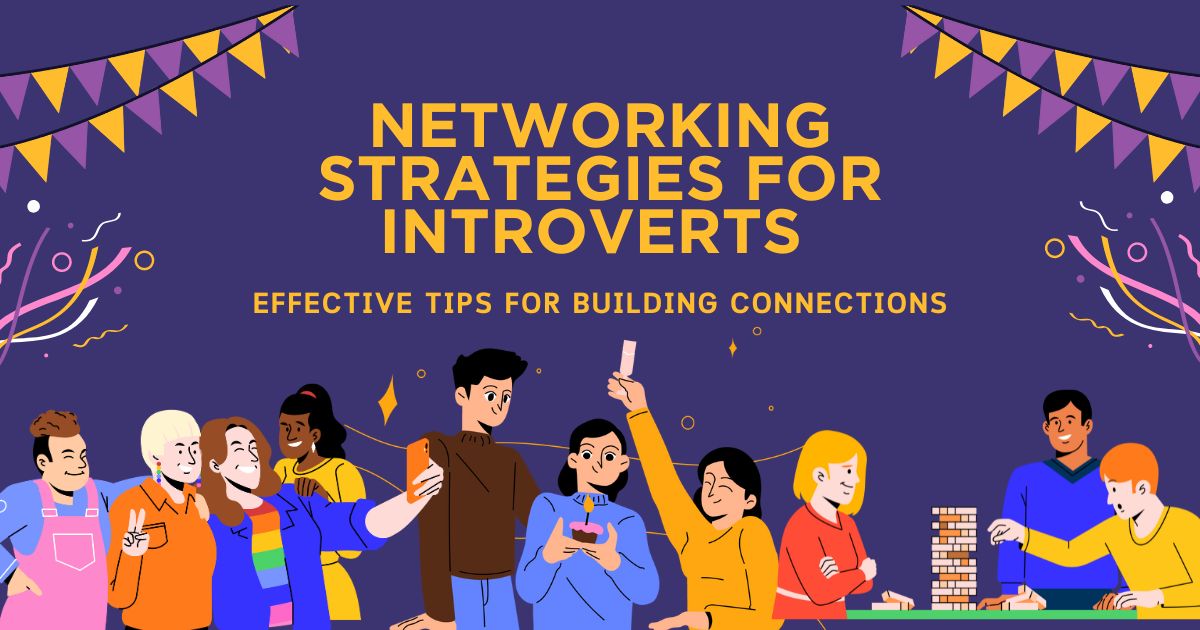Networking is a crucial aspect of business growth and professional development. However, for introverts, the idea of mingling with large groups, initiating conversations, and maintaining social interactions can be daunting. Fortunately, networking doesn’t have to be overwhelming. This article offers advice and strategies tailored specifically for introverts to help them network effectively and confidently.
Introduction: Understanding Introverted Networking
Introverts often prefer solitary or small group interactions and can feel drained by large social gatherings. Despite these tendencies, introverts possess unique strengths that can make them excellent networkers. Their ability to listen, think deeply, and build meaningful relationships are valuable assets in any networking scenario. By leveraging these strengths and adopting tailored strategies, introverts can network effectively without feeling overwhelmed.
Embrace Your Strengths
Recognizing and embracing your natural strengths is the first step toward effective networking.
1. Deep Listening
Introverts are often great listeners. Use this skill to your advantage by actively listening during conversations. People appreciate being heard and understood, and this can help you build stronger connections.
2. Thoughtful Engagement
Introverts tend to think before they speak, leading to thoughtful and meaningful contributions. This quality can help you stand out in networking situations, as your insights are likely to be valuable and well-considered.
3. Building Meaningful Relationships
Introverts excel at building deep, meaningful relationships. Focus on quality over quantity when networking, aiming to create a few strong connections rather than numerous superficial ones.
Prepare in Advance
Preparation can alleviate anxiety and boost confidence when networking.
1. Research Attendees
Before attending an event, research the attendees. Identify people you’d like to connect with and learn about their backgrounds and interests. This preparation can provide conversation starters and make interactions more comfortable.
2. Set Goals
Set specific, achievable goals for your networking efforts. For example, aim to meet three new people or have two meaningful conversations. Clear goals can provide direction and reduce the pressure to interact with everyone.
3. Develop an Elevator Pitch
Prepare a brief, engaging introduction about yourself and your work. An elevator pitch helps you communicate your value succinctly and confidently.
Choose Comfortable Settings
Selecting networking environments that align with your comfort level can make the experience more enjoyable.
1. Small Group Events
Opt for smaller networking events or gatherings where you can engage in one-on-one or small group conversations. These settings are typically less overwhelming than large conferences or parties.
2. Online Networking
Leverage online networking platforms, such as LinkedIn, to connect with others. Virtual interactions can be less intimidating and provide more control over the pace and timing of your engagements.
3. Interest-Based Groups
Join groups or organizations related to your interests or industry. Shared interests provide natural conversation topics and can make networking feel more organic and less forced.
Practice Active Engagement
Effective networking involves active participation, even if it’s outside your comfort zone.
1. Ask Open-Ended Questions
Engage others by asking open-ended questions that encourage them to share more about themselves. Questions like “What inspired you to start your business?” or “What projects are you currently excited about?” can lead to deeper conversations.
2. Share Personal Stories
Personal stories and experiences can create connections and make interactions more relatable. Don’t be afraid to share your journey, challenges, and successes.
3. Follow Up
After initial meetings, follow up with a personalized message. Express gratitude for the conversation, reference something specific you discussed, and suggest staying in touch. Following up reinforces the connection and demonstrates your genuine interest.
Manage Energy Levels
Networking can be draining for introverts, so it’s essential to manage your energy levels.
1. Take Breaks
Allow yourself to take breaks during events. Step outside for fresh air or find a quiet corner to recharge. Short breaks can help you maintain your energy and focus.
2. Schedule Downtime
Plan downtime before and after networking events to recharge. This can help you approach interactions with a positive and refreshed mindset.
3. Pace Yourself
Pace your networking efforts to avoid burnout. Attend events that align with your goals and comfort level, and don’t feel obligated to participate in every opportunity.
Leveraging Technology
Technology offers tools and platforms that can enhance your networking efforts.
1. Use LinkedIn
LinkedIn is a powerful tool for professional networking. Connect with people you meet at events, join industry groups, and participate in discussions. LinkedIn allows for ongoing engagement without the pressure of face-to-face interactions.
2. Attend Webinars and Online Conferences
Participate in webinars and online conferences to expand your network. These virtual events provide opportunities to interact with industry leaders and peers from the comfort of your home.
3. Utilize Networking Apps
Explore networking apps designed to facilitate connections based on shared interests and goals. Apps like Shapr and Bumble Bizz can help you find and connect with like-minded professionals.
Stories of Successful Introvert Networkers
Story 1: Bill Gates
Bill Gates, co-founder of Microsoft, is a self-identified introvert who has effectively leveraged his strengths to build a vast network. Gates’s thoughtful and deep engagement in conversations has helped him form meaningful relationships with industry leaders and innovators.
Story 2: Warren Buffett
Warren Buffett, one of the world’s most successful investors, is known for his introverted nature. Buffett values deep relationships and is a master of thoughtful listening and engagement, which have been crucial in his networking success.
Story 3: Susan Cain
Susan Cain, author of “Quiet: The Power of Introverts in a World That Can’t Stop Talking,” has successfully networked by embracing her introverted strengths. Cain’s approach involves deep listening, thoughtful conversation, and building meaningful connections, demonstrating that introverts can excel in networking.
Conclusion: Embrace Your Introverted Nature
Networking as an introvert may require a different approach, but it can be equally, if not more, effective. By embracing your strengths, preparing in advance, choosing comfortable settings, actively engaging, managing your energy levels, and leveraging technology, you can network confidently and build valuable connections. Remember, the goal is to create meaningful relationships that contribute to your personal and professional growth.
At CEO Space International, we are committed to supporting entrepreneurs in their networking endeavors. Our Inspire membership offers valuable resources, networking opportunities, and expert insights to help you succeed.
Join Our Free Inspire Membership
Take the first step towards effective networking by joining our free Inspire membership today. Gain access to valuable resources and connect with like-minded entrepreneurs in a supportive environment. Visit Inspire Membership to get started.

